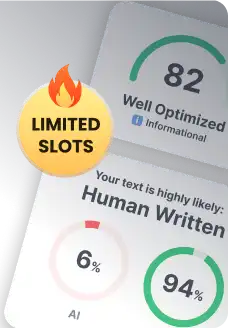Deepseek’s open-source approach benefits the AI community by promoting collaboration, encouraging transparency, and driving innovation. By opening up its tools and frameworks, it gives developers and researchers the power to iterate and improve on existing work. This accelerates the rate of innovation throughout the AI application space.
Open access further enables peer review and iterative improvements, leading to strong, resilient systems. This approach not only cuts down on development costs, but it makes it much easier for smaller teams and individuals to get in the game. It allows for diversity of thought, empowering innovative solutions to big problems.
Open-source approaches allow researchers to share findings freely, fostering collaboration and deeper knowledge from researchers around the world. Deepseek’s model is a testament to the power of open-source practices. It convenes deep expertise, accelerates innovation, and helps build a more equitable AI ecosystem, benefiting all of us.
Key Takeaways
- Open-source in AI increases access, accountability, and a shared approach. It provides everyone with free access to deepseek’s source codes, fueling innovation and creating a culture of shared improvement among developers.
- Open-source AI creates an environment of inclusivity and trust through wider access to datasets and algorithms. It supports accountability by limiting the ways that these resources can be spent.
- Open-source initiatives democratize AI tools, making them accessible to startups, researchers, and developers, thereby leveling the playing field and inspiring innovation across diverse sectors.
- Together, shared resources and collective efforts help to propel the open-source AI community faster towards groundbreaking developments and more effective problem-solving.
- Open-source solutions save money by eliminating licensing fees. This allows startups and smaller organizations to be more efficient with their budgets and scale their projects quickly and efficiently.
- The open-source approach to AI helps ensure ethical development and inclusivity. It promotes international collaboration and knowledge sharing, creating a more equitable and innovative future for AI.
What Is Open-Source in AI?
Open-source in AI describes the practice of making AI software and models freely available to the public. This involves sharing the underlying source code, datasets, and tools that drive these models. It opens the door for anyone from anywhere to access, modify, and contribute to the development of powerful AI technologies.
Open-source democratizes innovation. It democratizes access, removing the walls that closed, proprietary systems tend to erect. It fosters innovation by allowing researchers, developers, and organizations to work together at an unprecedented scale.
Definition and Core Principles
Open-source in AI refers to the concept of open, unrestricted access to the underlying code and models that power AI systems. This transparency creates an environment that fuels innovation through allowing developers to learn from and build upon these systems.
Open access to source code allows anyone to test things out and iterate upon prior work. Open-source principles focus heavily on collaboration, building a collective culture wherein developers from various backgrounds actively work together to improve technologies.
These guiding principles allow for easier identification of flaws and biases and redress, creating more robust and reliable AI tools.
How Open-Source Differs from Proprietary Systems
Proprietary AI systems keep their code and data locked away. This hinders collaboration and the pace of progress. Proprietary models tend to be built on closed datasets, leading to questions of transparency and trust.
Open-source models such as DeepSeek, Meta’s Llama, and others make this approach cost-efficient, scalable, and more accessible. For example, DeepSeek’s smaller “distilled models” provide more sustainable AI scaling, without sacrificing performance.
Examples of Open-Source AI Projects
Prominent examples include DeepSeek, Meta’s Llama, and Hugging Face. These projects have had an immense impact in AI. They have produced tremendous advancements that improve everything from natural language processing to making AI training more environmentally sustainable.
Open-source models aren’t just the domain of non-commercial research, and they’re becoming compelling alternatives to proprietary systems such as OpenAI’s GPT.
Advantages of Open-Source in AI
Open-source approaches in AI development are the way to go when it comes to building, sharing, and refining artificial intelligence technologies. Open-source platforms like DeepSeek focus on improving collaboration, transparency, and accessibility. This open-source approach not only drives innovation, but it addresses ethical and financial concerns. Below, we share the main advantages of embracing open-source within the AI community.
1. Promoting Transparency and Accountability
To build trust and confidence in AI and promote responsible and ethical practices, transparency is essential. Open-source models provide developers with full visibility into algorithms and training data. This visibility gives them a unique opportunity to scrutinize and refine these elements, making sure they produce equitable results.
By leveraging DeepSeek’s open-source framework, developers have access to technical documentation and code, helping to ensure accountability in all AI processes. This transparency fosters trust among stakeholders and promotes responsible use, lowering the chances of bias or misuse.
2. Driving Ethical AI Development
Ethical AI development benefits from as much diverse input as possible, and open-source frameworks promote an inclusive atmosphere that welcomes voices from different perspectives. With DeepSeek, the developers are working together to fix them, creating an AI that is fair and inclusive.
Open-source encourages placing ethical guidelines directly into the development process. This open community works together to develop these best practices for building more responsible AI solutions.
3. Democratizing Access to AI Tools
Open-source initiatives further democratize AI resources, putting them in the hands of small businesses, independent researchers, and anyone eager to learn. By removing licensing restrictions, DeepSeek’s models can be leveraged in educational, research and creative projects.
This inclusivity helps level the playing field, empowering smaller developers to compete with larger firms, which can lead to innovation across industries.
4. Accelerating Innovation Through Collaboration
Collaboration is one of the essential building blocks of open-source AI development. By making their resources available to one another, developers can make breakthroughs that would otherwise be impossible to make alone.
DeepSeek’s open-source model allows other experts to pool their knowledge, allowing for quicker breakthroughs in AI technology. In addition to delivering great products, collaborative projects create much-needed opportunities for skill-building and professional development within the AI community.
5. Reducing Costs in AI Development
Open-source AI reduces costs substantially by providing tools and resources that are free to use. DeepSeek’s models are highly customizable, as well as more affordable, making them perfect for cost-conscious startups and researchers.
The funds no longer needed can then be reinvested in infrastructure or attracting homegrown talent, creating the most efficient impact and fueling the long-term development of AI.
Role of Community Collaboration in AI
Grassroots collaboration is the key to competing in AI research. It fosters a climate in which individuals and institutions freely share ideas, resources, and expertise. DeepSeek’s open-source approach is a great example of this, fostering a community of developers and users to collaboratively improve and expand its tools.
This combined work fuels innovation, breaks down difficult challenges, and opens doors for transformative advancements in AI.
Enhancing Global Knowledge Sharing
Open-source platforms like DeepSeek facilitate collaboration across borders, linking developers from around the globe. Through collaborative efforts and community cooperation, the AI community can foster diverse perspectives, creative ideas, and innovative solutions.
DeepSeek’s transparency allows developers worldwide to customize its tools for targeted applications. This magic customization significantly increases both scalability and adaptability.
This innovative cross-border collaboration not only deepens AI projects but tackles global challenges, focusing on equitable access to advanced technology.
Fostering Open Research and Education
Want to try SurgeGraph for free?

Generate 20 documents

SEO tools (Auto Optimizer, Internal Linking, and more)

No credit card required
These open research initiatives that DeepSeek supports contribute to making AI education more accessible. Aspiring AI professionals can study open-source curricula, receiving hands-on experience with the most innovative tools.
For example, DeepSeek’s algorithms offer a real-world testbed to explore impartial data processing, benefiting both academics and technological innovation. Transparent, open research keeps our understanding of AI growing together, pushing the field towards more impactful innovations.
Building a More Inclusive AI Ecosystem
Inclusivity is critical in AI development, and DeepSeek’s open-source framework aims to empower underrepresented groups by offering more accessible tools and resources. For example, community-driven projects can address unique needs and amplify diverse voices in AI.
By supporting open-source initiatives, we can achieve a more equitable, innovative ecosystem where all developers have the resources they need to thrive.
Addressing Challenges Through Collective Efforts
Community collaboration is key to addressing AI’s widespread issues, like bias and inequality. Since DeepSeek is only as good as its training data, collaboration is key to ensuring its quality and fairness.
Successful examples, like community-led improvements in DeepSeek’s algorithms, demonstrate how collective efforts enhance AI tools, ensuring they meet global standards and future demands.
Cost Benefits of Open-Source AI Solutions
Open-source AI solutions offer a collaborative, transformative, cost-saving, and community-building opportunity to the AI community. These tools remove the financial barrier. They liberate developers, startups, and organizations to innovate at scale, without the massive costs associated with proprietary solutions.
DeepSeek’s solution, which perfectly balances cost with performance, is a prime example of these benefits in practice.
Eliminating Licensing Fees
Open-source platforms remove licensing costs, one of the most burdensome costs associated with proprietary AI systems. For municipalities, this allows critical projects to proceed without the burden of costly proprietary software licensing agreements.
We are proud to provide equally or more powerful tools as industry leaders OpenAI and Google. You can leverage these tools without spending a fortune on costly proprietary licenses.
This decreased fiscal constraint fosters creative thinking. This gives developers the freedom to experiment, iterate and test ideas without being constrained by budget restrictions. When the tools are available at no cost, projects can develop quickly – sometimes resulting in extraordinary, unforeseen discoveries.
Lowering Barriers to Entry for Startups
Startups have a few unique challenges, most notably in their access to advanced AI tools. Open-source solutions help to level the playing field by providing access to resources that once took millions of dollars to develop.
DeepSeek’s cost-effective, efficient methodologies, on the other hand, enable startups to deliver world-leading performance without the need for multi-billion-dollar investments. Through this accessibility, aspiring entrepreneurs are able to take their ideas and turn them into usable AI products.
This unique opportunity encourages innovation and extends the frontiers of the field.
Enabling Resource Optimization for Developers
Open-source frameworks promote productive use of resources. Developers can leverage community-contributed libraries and tools shortening the time and effort required to build from the ground up.
DeepSeek’s modular design, for instance, lets developers tailor and scale their models to their needs without needing expensive hardware upgrades. This flexibility greatly strengthens the body of projects awarded on an individual merit.
It fosters collaboration, as optimizations made available to everyone improve results for the whole AI community.
Supporting Scalable and Flexible Implementations
Scalability and flexibility are key in AI solutions and open-source models truly shine in this aspect. DeepSeek’s modular structure allows for effortless scaling, making it perfect for both discovery and manufacturing use cases without incurring extra hardware expenses.
This flexibility is what makes open-source technology so appealing to enterprises who want to customize AI systems to their specific needs. By adopting adaptable approaches, developers can better execute solutions that continuously align with community objectives and advancements in technology.
How Open-Source Shapes the Future of AI
Open-source has emerged as the backbone of propelling artificial intelligence forward, often changing how technology is developed and shared. By providing AI tools and resources for free, organizations like DeepSeek enable a collaborative ecosystem where innovation and progress thrive. This part explores the wide-ranging implications of open-source.
It paints a vivid picture of how open-source democratizes innovation, bridges gaps around the globe, champions ethical standards, and reduces our dependence on corporate monopolies.
Democratizing Innovation Across Industries
Open-source AI encourages innovation in many industries, including healthcare and agriculture. It gives access to powerful tools to startups, researchers, and independent developers. This lowers the barrier to entry and democratizes AI development by enabling smaller competitors to challenge entrenched corporations.
A new startup in renewable energy can leverage the same open-source machine learning models. This allows them to find the best energy storage solutions faster with fewer resources. This collaborative pool of knowledge creates the perfect storm for cross-industry innovation.
It opens up new applications that were previously unimaginable, such as personalized algorithms for precision medicine and AI-driven insights for analyzing climate change.
Bridging Gaps in Global Development
This accessibility is crucial in tackling disparities in technology adoption across the globe, something that open-source AI inherently supports. In underprivileged regions, free access to AI models enables local developers to create solutions tailored to their communities, such as predictive tools for agriculture in arid climates.
DeepSeek’s open-source approach illustrates how transparency builds trust and accountability. Collaboration among governments, NGOs, and open-source communities can continue to amplify global momentum, speeding up advancements in education, healthcare, and infrastructure.
Encouraging Standards and Regulations in AI
Creating community-driven innovation that reflects our collective values needs to be rooted in creativity tempered with ethical responsibility. Open-source AI drives the adoption of good standards that help keep AI safe and fair.
By involving diverse perspectives, community consensus helps shape best practices, such as mitigating bias in AI models or safeguarding user data. Open-source frameworks additionally act as an incubator for ethical guidelines, offering transparent and tangible standards for regulatory bodies to implement.
Reducing Reliance on Corporate Monopolies
DeepSeek’s open-source model has shaken the stranglehold of proprietary AI solutions and lessened the grip of big tech on DeepSeek’s work. That transition has led to a $1 trillion drop in their combined market value.
More fundamentally, it signals a meaningful redistribution of power within the AI industry. Independent developers now have the tools to contribute directly to AI advancements, resulting in a more diverse and balanced ecosystem.
As another example, open-source AI enables the development of customizable applications, providing targeted solutions for both enterprises and consumers.
Want to try SurgeGraph for free?

Generate 20 documents

SEO tools (Auto Optimizer, Internal Linking, and more)

No credit card required
Challenges of Open-Source in AI
It’s that kind of excitement that open-source AI projects foster and inspire great innovation, collaboration, and creativity. Yet at the same time, they face significant challenges that require ongoing attention. These challenges range from technical, ethical, and logistical dimensions, influencing the effectiveness and sustainability of these initiatives.
Recognizing these challenges is essential to creating and maintaining a vibrant open-source AI community.
Risks of Bias and Inequality in Data
Open-source datasets, though available to all, can still have biases built in that affect how AI models operate. For example, datasets that are not representative of different populations can reinforce harmful stereotypes or invisibilize marginalized communities.
Our feature story underscores the importance of more intentional data collection practices that center inclusivity. Developers need to be on guard themselves to find and fix bias in models before they ever see production. Without these initiatives, AI systems may perpetuate existing societal inequities.
Earlier Llama models had a hard time with simple tasks, such as counting letters in a word.
Ethical Concerns and Misuse of Technology
Open-source AI technologies create ethical dilemmas, especially when large models are used irresponsibly. Cisco’s recent research on R1 really highlights this, exposing safety loopholes that let damaging responses in via algorithmic jailbreaking methods.
Developers need to balance the need for innovation with the possibility of misuse and should ensure that their work is not used unethically. Responsible development practices are key to mitigating those risks, fostering and reinforcing trust.
Balancing Transparency with Privacy Needs
Transparency is a key tenet of open-source initiatives, though, and this needs to be weighed against user privacy. Secure data handling practices are required to protect sensitive information while enabling openness and transparency.
For example, even though DeepSeek’s V3 managed to reach state-of-the-art benchmarks, its black box nature, similar to OpenAI’s models, brings up concerns of privacy and transparency. Developers need to find solutions that honor both aims.
Overcoming Resource and Funding Limitations
Funding continues to be a major hurdle for open-source AI projects. Without proper funding, projects are hard-pressed to keep the ball rolling.
These limitations can be overcome by collaboration, as aligning shared public goals can pool both public expertise and private financial support. Community engagement, as ever, is the critical element here, building shared ownership and long-term sustainability.
Global Impact of Open-Source AI
Open-source AI has unleashed a democratizing force by providing incredible access, collaboration, and innovation that is unlike anything the AI community has ever seen. DeepSeek’s release of open-source AI models has accelerated this transformation. What it has done is incubated a dynamic atmosphere in which ideas and resources are exchanged freely around the world.
More than 700 models from DeepSeek-V3 and R1 are already publicly available on platforms such as HuggingFace. The uptake of open-source practices has been explosive. This could become a huge force multiplier for AI development. It further unlocks opportunities to address widespread chronic challenges found across industries and geographies, illustrating the vast potential benefits of open-source AI.
Advancing Research in Underdeveloped Regions
Open-source AI, for example, could improve research capacity in developing regions by making advanced tools and know-how more widely available. DeepSeek’s open-source models benefit from synthetic training data that democratizes AI development. This strategy gives researchers and academic institutions with fewer resources the tools they need to innovate more affordably.
Perhaps the best single example of this cooperation is the collaboration across sub-Saharan Africa. In another example, researchers utilized open-source models to improve the analysis of agricultural data, leading to higher crop yields. Encouraging partnerships between global AI leaders and local researchers can further amplify these benefits, driving advancements tailored to regional needs.
Creating Opportunities for Emerging Economies
Similarly, emerging economies stand to benefit significantly from more open-source AI initiatives. By breaking down barriers to access tools such as DeepSeek’s models, these economies are able to stimulate innovation and encourage entrepreneurship. Startups in India, for instance, have utilized open-source AI to create affordable healthcare technologies, addressing disparities in access to medicine.
The global AI market is projected to reach $190 billion by 2025. Supporting economic opportunities in this way through open-source projects would unlock extraordinary economic potential. Backing these kinds of initiatives helps make sure that emerging markets play a key role in determining the future of AI.
Supporting Cross-Border Collaboration in AI
Open-source platforms support international collaboration, which is crucial for advancing AI research and building multi-national partnerships that help to tackle global challenges. DeepSeek’s open-source approach will let researchers all over the world inspect and improve upon its models, fostering a spirit of trust and collaboration.
This shared progress is evident in projects addressing climate change, where researchers across continents use open-source AI to analyze and predict environmental shifts. Fostering global collaboration through efforts such as this one helps make sure that common challenges are addressed by combined expertise and resources.
Frequently Asked Questions
What is open-source in AI?
As open-source resources, anyone can use, modify, and share these resources to help foster a culture of innovation and collaboration in the AI community.
How does DeepSeek’s open-source approach benefit developers?
DeepSeek’s open-source approach benefits developers and the AI community by equipping them with free and accessible tools and resources. Any developer can take these tools and adapt and enhance them for their own specific needs, accelerating innovation and lowering development costs.
Why is community collaboration important in AI?
Community collaboration is key to fast tracking AI advancement. By sharing knowledge and resources, developers solve problems faster, create better solutions, and push AI technology forward for everyone’s benefit.
Does open-source AI reduce costs?
Yes. Open-source AI removes licensing fees and greatly lowers the cost of development. Organizations and individuals will be able to build on others’ tools and not start from scratch, which saves time and money.
How does open-source shape the future of AI?
Open-source supports collaboration, transparency, inclusivity, and rapid innovation. To make sure AI advancements serve broad and diverse communities, and to support responsible and ethical AI development, public scrutiny and collaboration are essential.
What are the challenges of open-source in AI?
Open-source AI has data privacy and security risk challenges, as well as the challenge of sustaining quality. Without oversight, these challenges can stifle innovation and undermine trust in open-source solutions.
What is the global impact of open-source AI?
Open-source AI is a step towards democratizing technological access around the globe. It connects the resource-rich with the resource-limited, making the development of AI a truly global endeavor and promoting a level playing field among those developing the technology.





